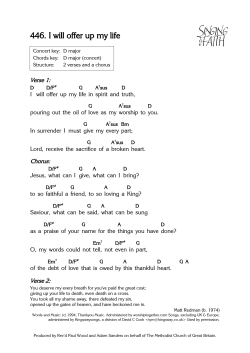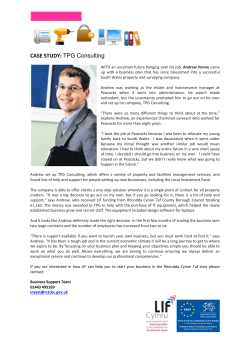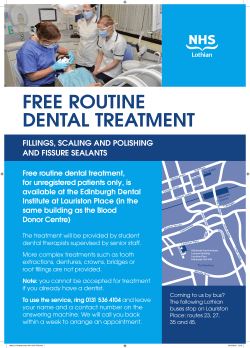
6 CONCERTS Early Music
6 Information Concert times and venues As our usual venue, St Cecilia’s Hall, is closed for renovation, this season’s concerts are being held at St Andrew’s & St George’s West, 13 George Street (except the December concert which is at Canongate Kirk, 153 Canongate) Edinburgh, and begin at 7.45pm. Refreshments and the McAlister Matheson Music CD stall are available from 7pm and seats can be reserved on arrival. Concerts last approximately two hours and refreshments are on sale during the interval. Tickets and subscriptions ● Full Price £18, Concessions £16, Students/Unwaged £5 Available from: The Queen’s Hall Box Office Tel. 0131 668 2019 and online at www.thequeenshall.net as St Dund St Howe Heri w ot Ro St Andrew’s & St George’s West n St Quee About St Andrew’s and St George’s West ’s drew St An are Squ treet Waverley Station e et St Mark Bank St Roya The Georgian Concert Society gratefully acknowledges support from its Supporters, Enterprise Music Scotland, Edinburgh Arts and Entertainment and Edinburgh University Collection of Historical Musical Instruments. l Mile The Georgian Concert Society is a charitable body, registered in Scotland with registration number SC003740. Leaflet designed by Hugh Hillyard-Parker, Edinburgh Cover image: ‘Suonatore di Liuto’, by Antiveduto Grammatica (1571–1626) Sponsored by Edinburgh Arts and Entertainment St Andrew’s & St George’s West, Edinburgh A Georgian gem in Edinburgh’s New Town Bridg und Princes St Gardens o The M es St Princ rley Wave t ver S Hano t rick S Frede ge S Geor St vid’s St Da St Thistle St Castle For further information about The Georgian Concert Society please visit the website www.gcs.org.uk or contact the Administrator on administrator@gcs.org.uk BYRD BACH HANDEL ZELENKA RAMEAU BEETHOVEN COUPERIN MOZART The GEORGIAN CONCERT Society 2014–2015 Subscribe to all six concerts and save up to £18 (Full price £90, Concessions £80). Apply directly to the Society via tickets@gcs.org.uk or 0131 447 5628. St Andrew’s Church (now St Andrew’s and St George’s West), with its distinctive oval shape, was the first church to be built in the Georgian New Town of Edinburgh. Opened in December 1784, it was designed by Andrew Frazer, chief army engineer for Scotland. A spire of 51m (168 feet) was added in 1787, making St Andrew’s the tallest building in the city at that time and a very prominent landmark. Suonatore di Liuto, by Antiveduto Grammatica (1571–1626) works by or from The Georgian Concert Society Tel. 0131 447 5628 • Email tickets@gcs.org.uk ● Superb CONCERTS of Glorious Early Music The GEORGIAN CONCERT Society 2014–2015 w w w. g c s. o rg. u k The GEORGIAN CONCERT Society 2014–2015 Season SATU R DAY 11 OC TOB ER 2 0 1 4 There is No Rose Ensemble Dresden was the epicentre of musical life in the 18th century. Under the patronage of Frederick Augustus the city became the musical hub of Europe attracting the greatest composers and performers of the day. Ensemble Marsyas will perform a selection of the extraordinarily virtuosic wind music sourced from the private cabinet of the Crown Princess, featuring works by Handel, Fasch, Zelenka and Weiss. Photo © Eric Richmond Critically acclaimed vocal consort Alamire perform Christmas motets by William Byrd interspersed with works from the Trinity Carol Roll (from Trinity College, Cambridge), the earliest source of the English polyphonic carol. The thirteen works in this manuscript include the famous Agincourt Carol, celebrating Henry V’s victory over the French in 1415, and the much-loved and Photo © Eric Richmond performed There is No Rose. In 1600 Will Kemp, a shameless selfpublicist and one of the leading actors in Shakespeare’s company, danced his way from London to Norwich in nine days, entertaining an adoring public en route. The Society of Strange and Ancient instruments, with dancer, Steven Player, celebrate Will Kemp’s account of the journey with raucous dance tunes and more refined music of the Elizabethan age. They will breathe new life into this celebrated event, which remains awe-inspiring 400 years on, and still has the power to delight, baffle and amuse. Clare Salaman directs, with Jeremy Avis, Alison McGillivray, Ian Harrison and Keith McGowan. Ensemble Marsyas: Josep Domènech Lafont oboe, Molly Marsh oboe, Peter Whelan bassoon, Thomas Dunford theorbo, Philippe Grisvard harpsichord, Christine Sticher violone ‘… it’s the group’s nuance that’s transfixing… The players are audibly intelligent, at once humorous and illuminating…’ BBC Music Magazine Alamire: Kirsty Hopkins soprano, Ruth Massey mezzosoprano, Nicholas Todd tenor, William Gaunt bass, Andrew Lawrence-King harps. ‘Extremely fine performances ... outstanding, authoritative, and thus essential listening’ Early Music ‘A Renaissance Fred Astaire… Steven Player was worth the price of admission by himself’ Adelaide Review SATURDAY 21 MARCH 2015 Baroque Ensemble LUX SATU R DAY 31 JAN UARY 2015 ‘[Among] our finest exponents of early music. [The Society] enchant and amaze in equal measure’ The Musician Rachel Podger Violin and Kristian Bezuidenhout Fortepiano SATU R DAY 15 N OVE M B ER 2 0 1 4 Mozart and Beethoven Violin Sonatas The Flautadors Recorder Quartet The City of Light Baroque Ensemble LUX provides a snapshot of the bustling city of Paris in the 17th and 18th centuries. The ensemble will transport the audience to the royal court at Versailles, as well as to some of the featured composers’ favourite local suburbs, and also paint a picture of rustic jollity within the surrounding countryside. Programme to include Pièces de Clavecin en concert by Rameau, Concerts Royaux by Couperin, works for Viola da gamba by Sainte-Colombe from the Panmure collection and extravagant harpsichord pieces by Royer. Mozart Sonatas for violin & piano in B flat major, K454; in D major, K306; in E flat major, K302 Beethoven Sonata for violin & piano in C minor, Op 30/2 Flauti di camera The Flautadors present a programme of virtuosic music from the 18th Century, when the recorder was at the height of its popularity. Featuring dazzling concerti by Telemann and Vivaldi, fugues by JS Bach, exquisite chamber music by Handel and Loeillet and intriguing works by the prolific woodwind composer and arranger Schickhardt. The sonata was the main form for experimentation in the Classical period. While Mozart’s violin sonatas display virtuosity along with clear classic style, Beethoven’s shows the newer developments at the beginning of the 19th century. This performance will feature a copy of a fortepiano by Johann Schantz of c.1790. Podger and Bezuidenhout have both virtuosity and stylistic flair, and their performances are bound to captivate. ‘Rachel Podger lets the music shine – what unity of art and personality’ Göttinger Tageblatt ‘The finest living exponent of the fortepiano’ The Herald Baroque Ensemble LUX: Merlin Harrison recorders, Claudia Norz violin, Nikolay Ginov cello, Asako Ogawa harpsichord Photo © Marco Borggreve Photo © Jonas Sacks The Flautadors Recorder Quartet – Catherine Fleming, Celia Ireland, Merlin Harrison and Ian Wilson – is joined by Harriet Wiltshire cello and Kasia Tomczak-Feltrin harpsichord. Photo © Gulcan Auckland From the Dresden Court Alamire directed by David Skinner Nine Daies Wonder Photo © Patrick Baldwin Ensemble Marsyas SATU R DAY 13 DE CE M B E R 2014 In Canongate Kirk The Society of Strange and Ancient Instruments ‘Recorder quartets of this quality are rare’ Early Music News SATURDAY 28 FEBRUARY 2015
© Copyright 2025




















